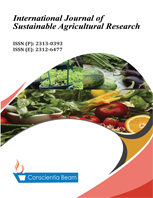Estimating the welfare effect of food price increase on households in Nigeria: Direct and substitution effect approach
DOI:
https://doi.org/10.18488/ijsar.v10i1.3252Abstract
Increases in food prices in Nigeria have raised huge concerns on the impact welfare of poor households who have substantial share of their spending on food. This study investigated the welfare effects (including the direct and substitution effects) of food price changes on households in Nigeria. The study employed time series data on food prices from 1991-2013 and household survey data obtained from the National household Survey (wave 2). We group household consumption expenditure on different food and non-food commodities into nine (9) namely; fish, meat, pulses, fruit & vegetable, fat & oil, beverages, wheat, rice, corn, and others. Welfare effect was analyzed by compensating variation. The results showed that a safety net program would net to transfer an amount equivalent to 0.76%, 0.26% and 1.02% of the total national consumption to fully compensate the poorest quintile in rural, urban and at the national level respectively. And also, in the richest losers’ quintile about 1.29% of the aggregate national consumption will be required by a safety net program to fully compensate them overall. The study concluded that food price changes related significantly with welfare status of the respondents as tested by CV model. Welfare gain was enjoyed mostly by urban household whose mean compensated variation was as high as 18% compared with 14% for rural household.

